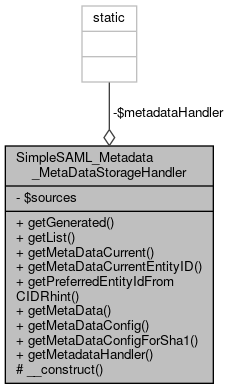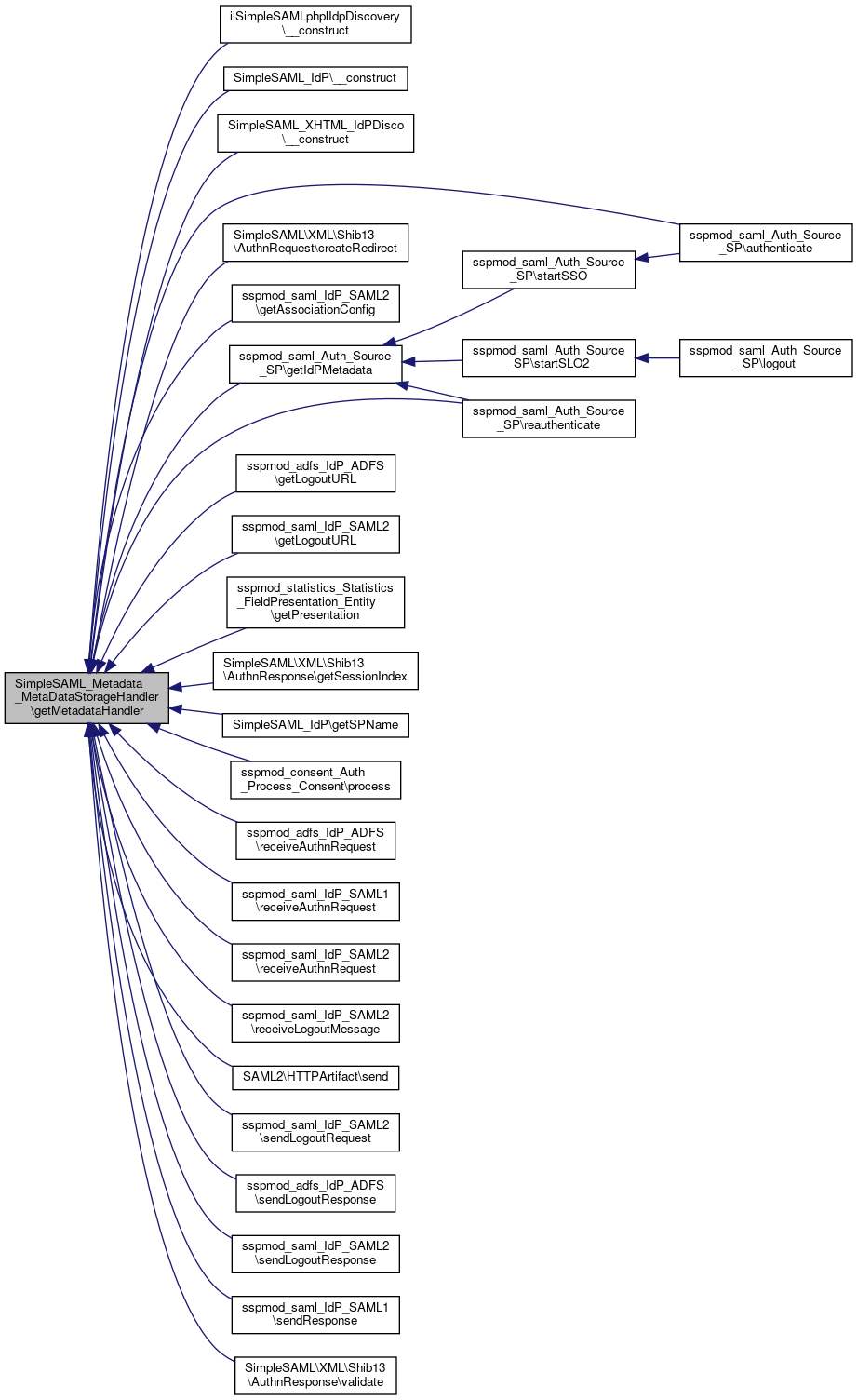 Collaboration diagram for SimpleSAML_Metadata_MetaDataStorageHandler:
Collaboration diagram for SimpleSAML_Metadata_MetaDataStorageHandler:Public Member Functions | |
| getGenerated ($property, $set) | |
| This function is used to generate some metadata elements automatically. More... | |
| getList ($set='saml20-idp-remote') | |
| This function lists all known metadata in the given set. More... | |
| getMetaDataCurrent ($set) | |
| This function retrieves metadata for the current entity based on the hostname/path the request was directed to. More... | |
| getMetaDataCurrentEntityID ($set, $type='entityid') | |
| This function locates the current entity id based on the hostname/path combination the user accessed. More... | |
| getPreferredEntityIdFromCIDRhint ($set, $ip) | |
| This method will call getPreferredEntityIdFromCIDRhint() on all of the sources. More... | |
| getMetaData ($index, $set) | |
| This function looks up the metadata for the given entity id in the given set. More... | |
| getMetaDataConfig ($entityId, $set) | |
| Retrieve the metadata as a configuration object. More... | |
| getMetaDataConfigForSha1 ($sha1, $set) | |
| Search for an entity's metadata, given the SHA1 digest of its entity ID. More... | |
Static Public Member Functions | |
| static | getMetadataHandler () |
| This function retrieves the current instance of the metadata handler. More... | |
Protected Member Functions | |
| __construct () | |
| This constructor initializes this metadata storage handler. More... | |
Private Attributes | |
| $sources | |
Static Private Attributes | |
| static | $metadataHandler = null |
Detailed Description
Definition at line 10 of file MetaDataStorageHandler.php.
Constructor & Destructor Documentation
◆ __construct()
|
protected |
This constructor initializes this metadata storage handler.
It will load and parse the configuration, and initialize the metadata source list.
Definition at line 54 of file MetaDataStorageHandler.php.
References $config, $type, SimpleSAML_Configuration\getInstance(), and SimpleSAML_Metadata_MetaDataStorageSource\parseSources().
 Here is the call graph for this function:
Here is the call graph for this function:Member Function Documentation
◆ getGenerated()
| SimpleSAML_Metadata_MetaDataStorageHandler::getGenerated | ( | $property, | |
| $set | |||
| ) |
This function is used to generate some metadata elements automatically.
- Parameters
-
string $property The metadata property which should be auto-generated. string $set The set we the property comes from.
- Returns
- string The auto-generated metadata property.
- Exceptions
-
Exception If the metadata cannot be generated automatically.
Definition at line 85 of file MetaDataStorageHandler.php.
References $baseurl, $config, SimpleSAML_Configuration\getInstance(), and getMetaDataCurrent().
 Here is the call graph for this function:
Here is the call graph for this function:◆ getList()
| SimpleSAML_Metadata_MetaDataStorageHandler::getList | ( | $set = 'saml20-idp-remote' | ) |
This function lists all known metadata in the given set.
It is returned as an associative array where the key is the entity id.
- Parameters
-
string $set The set we want to list metadata from.
- Returns
- array An associative array with the metadata from from the given set.
Definition at line 139 of file MetaDataStorageHandler.php.
References $key, $result, $source, and SimpleSAML\Logger\warning().
 Here is the call graph for this function:
Here is the call graph for this function:◆ getMetaData()
| SimpleSAML_Metadata_MetaDataStorageHandler::getMetaData | ( | $index, | |
| $set | |||
| ) |
This function looks up the metadata for the given entity id in the given set.
It will throw an exception if it is unable to locate the metadata.
- Parameters
-
string $index The entity id we are looking up. This parameter may be NULL, in which case we look up the current entity id based on the current hostname/path. string $set The set of metadata we are looking up the entity id in.
- Returns
- array The metadata array describing the specified entity.
- Exceptions
-
Exception If metadata for the specified entity is expired. SimpleSAML_Error_MetadataNotFound If no metadata for the entity specified can be found.
Definition at line 269 of file MetaDataStorageHandler.php.
References $index, $metadata, $source, and getMetaDataCurrentEntityID().
Referenced by getMetaDataConfig(), and getMetaDataCurrent().
 Here is the call graph for this function:
Here is the call graph for this function: Here is the caller graph for this function:
Here is the caller graph for this function:◆ getMetaDataConfig()
| SimpleSAML_Metadata_MetaDataStorageHandler::getMetaDataConfig | ( | $entityId, | |
| $set | |||
| ) |
Retrieve the metadata as a configuration object.
This function will throw an exception if it is unable to locate the metadata.
- Parameters
-
string $entityId The entity ID we are looking up. string $set The metadata set we are searching.
- Returns
- SimpleSAML_Configuration The configuration object representing the metadata.
- Exceptions
-
SimpleSAML_Error_MetadataNotFound If no metadata for the entity specified can be found.
Definition at line 315 of file MetaDataStorageHandler.php.
References $entityId, $metadata, getMetaData(), and SimpleSAML_Configuration\loadFromArray().
 Here is the call graph for this function:
Here is the call graph for this function:◆ getMetaDataConfigForSha1()
| SimpleSAML_Metadata_MetaDataStorageHandler::getMetaDataConfigForSha1 | ( | $sha1, | |
| $set | |||
| ) |
Search for an entity's metadata, given the SHA1 digest of its entity ID.
- Parameters
-
string $sha1 The SHA1 digest of the entity ID. string $set The metadata set we are searching.
- Returns
- null|SimpleSAML_Configuration The metadata corresponding to the entity, or null if the entity cannot be found.
Definition at line 334 of file MetaDataStorageHandler.php.
References $result, $source, and SimpleSAML_Configuration\loadFromArray().
 Here is the call graph for this function:
Here is the call graph for this function:◆ getMetaDataCurrent()
| SimpleSAML_Metadata_MetaDataStorageHandler::getMetaDataCurrent | ( | $set | ) |
This function retrieves metadata for the current entity based on the hostname/path the request was directed to.
It will throw an exception if it is unable to locate the metadata.
- Parameters
-
string $set The set we want metadata from.
- Returns
- array An associative array with the metadata.
Definition at line 178 of file MetaDataStorageHandler.php.
References getMetaData().
Referenced by getGenerated().
 Here is the call graph for this function:
Here is the call graph for this function: Here is the caller graph for this function:
Here is the caller graph for this function:◆ getMetaDataCurrentEntityID()
| SimpleSAML_Metadata_MetaDataStorageHandler::getMetaDataCurrentEntityID | ( | $set, | |
$type = 'entityid' |
|||
| ) |
This function locates the current entity id based on the hostname/path combination the user accessed.
It will throw an exception if it is unable to locate the entity id.
- Parameters
-
string $set The set we look for the entity id in. string $type Do you want to return the metaindex or the entityID. [entityid|metaindex]
- Returns
- string The entity id which is associated with the current hostname/path combination.
- Exceptions
-
Exception If no default metadata can be found in the set for the current host.
Definition at line 194 of file MetaDataStorageHandler.php.
References $entityId, $index, $source, $type, SimpleSAML\Utils\HTTP\getSelfHost(), and SimpleSAML\Utils\HTTP\getSelfHostWithPath().
Referenced by getMetaData().
 Here is the call graph for this function:
Here is the call graph for this function: Here is the caller graph for this function:
Here is the caller graph for this function:◆ getMetadataHandler()
|
static |
This function retrieves the current instance of the metadata handler.
The metadata handler will be instantiated if this is the first call to this function.
- Returns
- SimpleSAML_Metadata_MetaDataStorageHandler The current metadata handler instance.
Definition at line 40 of file MetaDataStorageHandler.php.
References $metadataHandler.
Referenced by SimpleSAML_IdP\__construct(), ilSimpleSAMLphplIdpDiscovery\__construct(), SimpleSAML_XHTML_IdPDisco\__construct(), sspmod_saml_Auth_Source_SP\authenticate(), SimpleSAML\XML\Shib13\AuthnRequest\createRedirect(), sspmod_saml_IdP_SAML2\getAssociationConfig(), sspmod_saml_Auth_Source_SP\getIdPMetadata(), sspmod_adfs_IdP_ADFS\getLogoutURL(), sspmod_saml_IdP_SAML2\getLogoutURL(), sspmod_statistics_Statistics_FieldPresentation_Entity\getPresentation(), SimpleSAML_IdP\getSPName(), sspmod_consent_Auth_Process_Consent\process(), sspmod_saml_Auth_Source_SP\reauthenticate(), sspmod_adfs_IdP_ADFS\receiveAuthnRequest(), sspmod_saml_IdP_SAML1\receiveAuthnRequest(), sspmod_saml_IdP_SAML2\receiveAuthnRequest(), sspmod_saml_IdP_SAML2\receiveLogoutMessage(), sspmod_saml_IdP_SAML2\sendLogoutRequest(), sspmod_adfs_IdP_ADFS\sendLogoutResponse(), sspmod_saml_IdP_SAML2\sendLogoutResponse(), sspmod_saml_IdP_SAML1\sendResponse(), and SimpleSAML\XML\Shib13\AuthnResponse\validate().
 Here is the caller graph for this function:
Here is the caller graph for this function:◆ getPreferredEntityIdFromCIDRhint()
| SimpleSAML_Metadata_MetaDataStorageHandler::getPreferredEntityIdFromCIDRhint | ( | $set, | |
| $ip | |||
| ) |
This method will call getPreferredEntityIdFromCIDRhint() on all of the sources.
- Parameters
-
string $set Which set of metadata we are looking it up in. string $ip IP address
- Returns
- string The entity id of a entity which have a CIDR hint where the provided IP address match.
Definition at line 244 of file MetaDataStorageHandler.php.
Field Documentation
◆ $metadataHandler
|
staticprivate |
Definition at line 21 of file MetaDataStorageHandler.php.
Referenced by getMetadataHandler().
◆ $sources
|
private |
Definition at line 30 of file MetaDataStorageHandler.php.
The documentation for this class was generated from the following file:
- libs/composer/vendor/simplesamlphp/simplesamlphp/lib/SimpleSAML/Metadata/MetaDataStorageHandler.php













